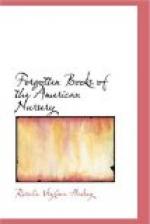N.B. This Receipt
will serve when a Female is the subject of your
Elegy, provided you
borrow a greater Quantity of Virtues,
Excellencies &c.
Of other original books for children of colonial parents in the first quarter of that century, “A Looking-glass” did but mirror more religious episodes concerning infants, while Mather in his zeal had also published “An Earnest Exhortation” to New England children, and “The A, B, C, of religion. Fitted unto the youngest and lowest capacities.” To this, taking advantage of the use of rhymes, he appended further instruction, including “The Body of Divinity versified.” With our knowledge of the clergyman’s methods with his congregation it is not difficult to imagine that he insisted upon the purchase of these godly aids for every household.
In attempting to reproduce the conditions of family life in the early settlements and towns of colonial days, we turn quite naturally to the newspapers, whose appearance in the first quarter of the eighteenth century was gladly welcomed by the people of their time, and whose files are now eagerly searched for items of great or small importance. Indeed, much information can be gathered from their advertisements, which often filled the major part of these periodicals. Apparently shop-keepers were keen to take advantage of such space as was reserved for them, as sometimes a marginal note informed the public that other advertisements must wait for the next issue to appear.
Booksellers’ announcements, however, are not too frequent in Boston papers, and are noticeably lacking in the early issues of the Philadelphia “Weekly Mercury.” This dearth of book-news accounts for the difficulty experienced by book-lovers of that town in procuring literature—a lack noticed at once by the wide-awake young Franklin upon his arrival in the city, and recorded in his biography as follows:
“At the time I established myself in Pennsylvania [1728] there was not a bookseller’s shop in any of the colonies to the southward of Boston. In New York and Phil’a the printers were indeed stationers; they sold only paper, etc., ballads, and a few books. Those who lov’d reading were obliged to send for their books from London.”




